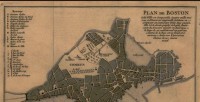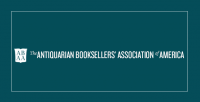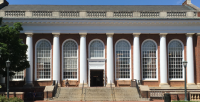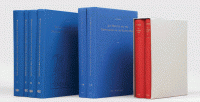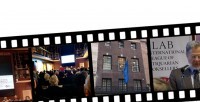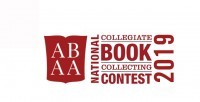The Boston Virtual Book Fair will take place at www.abaa.org/vbf from 11AM EST on Thursday, November 12 until 7PM EST on Saturday, November 14, 2020. Schedule: THURSDAY, NOVEMBER 12 11AM EST Patron Preview Patron Preview tickets are available here... (A portion of proceeds supports the ABAA Benevolent Fund.) FRIDAY, NOVEMBER 13 11AM EST Book Fair Opens for Free Admission 1PM EST Julia Child and Company: Culinary Delights at the Schlesinger Library Details and register for this event... 2PM EST Virtual Scavenger Hunt Begins Details to be shared via the ABAA Facebook page at 2PM EST on Friday, November 13. 3PM EST The Curious Case of Chloe Russell's “The Complete Fortune Teller and Dream Book” Details and register for this event... 5PM EST Reading the Drink/Drinking the Read Details and register for this event... SATURDAY, NOVEMBER 14 11:30AM EST Boston Virtual Book Fair Tour: The Art of the Book Details and register for this event... 1PM EST Historical Artifacts and the Myths of the Women's Voting Rights Movement Details and register for this event... 3PM EST The Ticknor Society Collectors' Roundtable Details and register for this event... 7PM EST Virtual Book Fair Closes For more information about the Boston Virtual Book Fair visit www.abaa.org/vbf... For tickets to the Patron Preview click here... To register for all other events at the Boston Virtual Book Fair, click here... [more Boston Virtual Book Fair Schedule]
Bookselling
The ABAA has launched a program where seasoned ABAA members act as mentors, i.e. business advisors and guides, to novices in the rare book field and/or those not currently in the trade but whose background and interest in the vocation would make them good candidates to enter the field. The goals of this program are to: • Provide dealers early in their careers with the opportunity to advance their professional development • Build a recruitment pipeline for the Association that enhances the number of qualified applicants and diversifies the membership • Afford mentees the opportunity to build a relationship with an ABAA member • Educate potential candidates about a career in the trade (for example, graduate students looking for a profession outside of academia) Structure ABAA Headquarters is responsible for coordinating and implementing the program. Mentors and mentees will be paired with consideration of a variety of factors such as any specific requests, specialization/area of focus, and business structure. Location could also be a point of consideration but, with the availability of technology like Skype, need not be a requirement. Once paired, mentors and mentees will be introduced via ABAA Headquarters and, if both felt that it was a suitable fit, would commence a one year period of mentorship. Over the course of the year, mentors and mentees are required to have face to face communication for a minimum of 1-2 hours each month (this could be completed electronicall... [more ABAA Launches Mentorship Program for Novice Book and Manuscript Sellers]
JAMES CUMMINS BOOKSELLER of New York City is seeking an experienced antiquarian bookseller and rare book cataloguer familiar with the full range of material handled by the firm: printed books from incunables to modern literature, as well as manuscripts, autographs, archives, ephemera, and illustration art. The ideal candidate will have strong writing skills, as well as practical, demonstrable knowledge of descriptive cataloguing (including collation, bibliography, and knowledge of reference sources) from an antiquarian bookselling perspective, with suitable foreign language skills (at least one classical or modern European language beyond English). Sales experience is essential, including the ability to engage new customers (private and institutional), conclude sales, and maintain relations with existing customers. The ideal candidate will enjoy working collaboratively as a member of a small team in cataloguing, buying, researching, and selling rare books, and will have areas of particular expertise or specialization. This is a full-time position. Some travel will be required. Salary: $70,000 plus benefits, or commensurate with experience. Please send CV and references to Henry Wessells, henry@jamescumminsbookseller.com (e-mail only). [more Position Opening at James Cummins Bookseller]
In an effort to assist in the recovery of materials missing as a result of the Carnegie Library theft, the ABAA would like to bring to the public's attention the list of items believed stolen. Click this link to view the list. Update 8/20/18: The following list includes more details. Should any member of the public identify having purchased or otherwise having knowledge of the disposition or current location of any items from the Carnegie Library—whether on this list or not—please contact one of the following detectives from Allegheny County District Attorney's Office: · Det. Fran Laquatra (412) 388-5305 flaquatra@alleghenycountyda.us · Det. Perann Tansmore (412) 388-5307 ptansmore@alleghenycountyda.us ` · Det. Lyle Graber (412) 388-5316 lgraber@alleghenycountyda.us Please note, the detectives do not have reason to believe that anyone who may have purchased any of these items was necessarily aware that the material had been reported stolen. The ABAA appreciates your attention and assistance with respect to this grave matter. Please check our post from March for further details, including additional information on collection markings. Sincerely, Vic Zoschak President, ABAA Brad Johnson Chair, ABAA Security Committee Susan Benne Executive Director, ABAA [more Carnegie Library Theft]
The ABAA's Woodburn Fund provides financial support for scholarly research and education relevant to the antiquarian book trade. This includes annual scholarships to Rare Book School, California Rare Book School, and the Colorado Antiquarian Book Seminar. Ezra Tishman of Aardvark Books/Ezra the Bookfinder attended the Rare Book School on a Woodburn Fund scholarship this year. (We published his rave review of the Rare Book School and the Woodburn Fund in June.) We asked Ezra a few questions about his time at the Rare Book School, and he responded with a glowing review of the whole experience. ABAA: Why is it important for a bookseller to take part in this kind of “mid-career” training? Ezra Tishman: Mid-career booksellers can easily become overwhelmed with the logistics of acquiring, cataloging and selling stock, preparing for fairs, etc. A mid-career training offers the opportunity to “blow out the pipes” so to speak, to view the trade afresh, and to keep the bookseller open to educational avenues either neglected, or those never yet known. Those outside the trade might assume you acquire all the knowledge you need through your daily experiences dealing with what comes through your door? ET: Not by a long shot. Developing as a mature and capable bookseller means being ever-willing to be schooled, on multiple fronts — not only by the books and customers who cross my threshold, but by being open to filling-in specific gaps in knowledge, widening and strengthening fami... [more Reflections on Attending the Rare Book School]
Sally Burdon, ILAB President, has announced that The B.H. Breslauer Foundation is investing another $25,000 in the Breslauer Foundation Prize Fund, meaning that “this important prize for bibliography can continue to be awarded for many years to come.” “We owe a great debt to The B.H. Breslauer Foundation for their generosity and support,” said Burdon. Felix de Marez Oyens, President of the B.H. Breslauer Foundation, commented that: “My fellow trustees and I are pleased to make this additional donation in order to enable the ILAB to award every fourth year not only the main bibliography prize of $10,000, but also second and third prizes of $5,000 and $3,000 respectively. The discipline of bibliography is not usually a lucrative pursuit. It is important therefore that the practitioners of this branch of scholarship be encouraged as much as possible by institutional libraries and also by the rare-book trade, which profit from it. We hope that these prizes, which are not inconsiderable, will continue to play a major role in that encouragement.” The ILAB Breslauer Prize for Bibliography honors the most original and outstanding published work in the field of bibliography. It is awarded every four years. The most-recent winner is Dutch scholar Ina Kok, whose Woodcuts in Incunabula Printed in the Low Countries (Brill, April 2013) was awarded the prize in 2018. The next prize will be awarded in 2022. The ILAB Prize for Bibliography was founded in 1964. In 2008, its name wa... [more New Investment in ILAB Breslauer Prize]
The ABAA's Woodburn Fund provides financial support for scholarly research and education relevant to the antiquarian book trade. This includes annual scholarships to Rare Book School, California Rare Book School, and the Colorado Antiquarian Book Seminar. Ezra Tishman of Aardvark Books/Ezra the Bookfinder was the recipient of a Woodburn Fund scholarship to Rare Book School this year and had the following to say about his experience. I wanted to take moment to officially thank the ABAA for the scholarship assistance I received to attend a Rare Book School course in Bloomington, Indiana. The assistance allowed me to take the time off from work, and I spent an amazing week at Indiana University's Lilly Library, learning from the legendary "Master of Bibliographical Resources", Joel Silver. His encyclopedic knowledge of available references -- and his folksy delivery of just a slice of his vast body of knowledge — rather blew me away. In the first two days of the course — despite twenty-five years fulltime in the trade, I truly wondered about what I really knew, and how I could have worked so long without the benefit of some of these resources. I've no doubt at all that what I gained from attendance at Joel's course will prove indispensable, in both my capacities as bookseller and appraiser. Again huge gratitude to our organization for its commitment to help members grow and thrive in the trade. Scholarships to Rare Books School and California Rare Book School are awarded ann... [more Woodburn Fund Scholarship Recipient on Rare Book School]
On March 5, 2019, the International League of Antiquarian Booksellers (ILAB) held the symposium Who Owned This? Libraries and the Rare Book Trade Consider Issues Surrounding Provenance, Theft and Forgery at the renowned New York book collectors club, the Grolier Club, jointly organized with the Antiquarian Booksellers Association of America (ABAA). Rare booksellers are faced with increasing demands from institutions to have strong provenance on materials they buy. Booksellers need to know how to deal with this and have a good understanding of what libraries need. The symposium brought together a range of experts and scholars from the antiquarian book trade and libraries, as well as the fields of investigation, insurance, art law, and technology. April 10, 2019 is the first International Provenance Research Day with more than 60 cultural institutions in Germany, Great Britain, Austria, the Netherlands, and Switzerland organizing large number of symposiums and workshops at museums, archives and libraries. Coinciding with this important initiative, ILAB launches the videos of the New York Provenance Symposium. As Sally Burdon, ILAB President said in her introduction on the day: “The popular image of an old bookshop with a slightly eccentric bookseller selling books in a shop untidily crammed with books and a computer nowhere in sight, is not the modern reality. Antiquarian books, manuscripts, maps, prints etc. are constantly being traded across international borders. Because o... [more Provenance Symposium Video Archive]
In honor of long-time member Florence Shay (1922-2012), the Midwest Chapter of the ABAA offers an educational scholarship to booksellers from the Midwest Chapter region to attend the 2019 Colorado Antiquarian Book Seminar. It covers full tuition plus room & board expenses for one attendee to this year's Seminar. All applications must be received by midnight, May 01, 2019. Applicants will be notified of the award decision via email on or before May 15, 2019. Each application must include at least one written letter of support by a professional bookseller or rare book librarian, as well as the applicant's biography and essay. These can be submitted via email to the Scholarship Committee Chair at chairmwabaachapter@gmail.com or by regular mail to: Daniel Weinberg, Abraham Lincoln Book Shop, Inc., Ste. 100 824 W. Superior St., Chicago, IL 60642. To apply for The Florence Shay/Midwest Chapter CABS Scholarship please provide the following: • A completed copy of the application form. • A personal biographical statement or essay (no longer than two pages) in which you describe your past or current experience in the world of antiquarian books, your goals for the future, and what you hope to gain from the studies afforded by this scholarship. If you have attended an antiquarian book fair in the past, please offer an observation or impression gained from that experience. • Letter of support written by a professional bookseller or rare book librarian. Click here for additional info... [more The Florence Shay Scholarship to the Colorado Antiquarian Book Seminar]
The ABAA is accepting entries for the 2019 National Collegiate Book Collecting Contest, once again supported by the Jay I. Kislak Foundation, the generous underwriter of prizes for this contest. The National Collegiate Book Collecting Contest is open to all prizewinners of college book-collecting contests, whether or not first prize, as well as to interested students whose institutions do not offer formal contests. (More information can be found here.) All entries should be submitted at apply.abaa.org. All entries for the 2019 competition must be submitted by June 13, 2019. For more information on the contest, please visit contest.abaa.org. The National Collegiate Book Collecting Contest is jointly administered by the Antiquarian Booksellers' Association of America (ABAA), the Fellowship of American Bibliophilic Societies (FABS), the Grolier Club, and the Center for the Book and the Rare Books and Special Collections Division (the Library of Congress), with major and exclusive support for the Kislak Prize from the Jay I. Kislak Foundation. Meet the 2018 NCBCC winners... Don't miss any articles on The New Antiquarian blog! Subscribe to the ABAA email newsletter! * indicates required Email Address * Email Format html text #mc_embed_signup{background:#fff; clear:left; font:14px Helvetica,Arial,sans-serif; width:420px;} /* Add your own MailChimp form style overrides in your site stylesheet or in this style block. We recommend moving this block and the preceding CSS link to the HE... [more National Collegiate Book Collecting Contest 2019]


